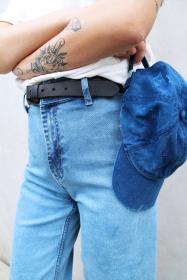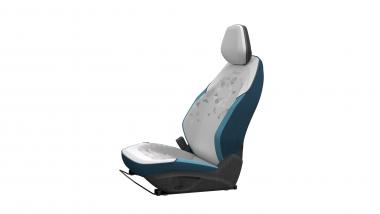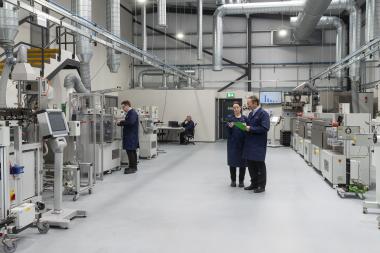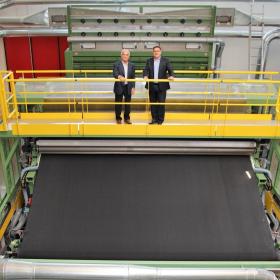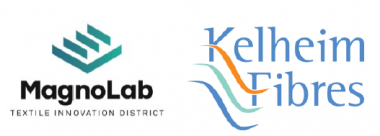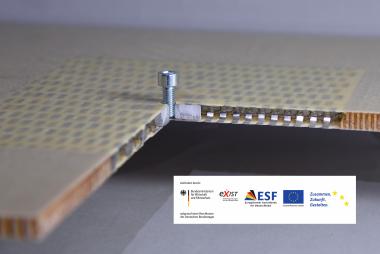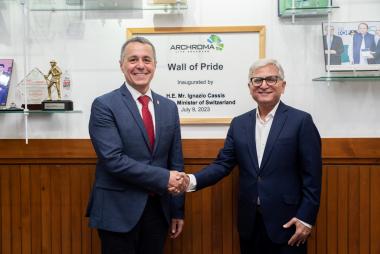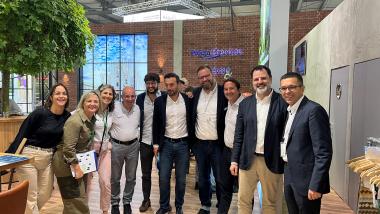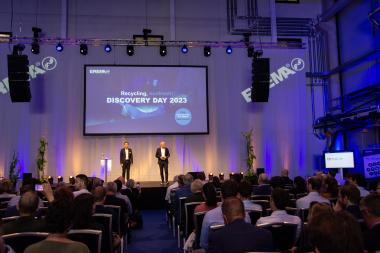Solvay announces Board of Directors for standalone SYENSQO
Solvay announced the future Board of Directors of SYENSQO, effective upon completion of the planned separation of Solvay into two companies – SOLVAY and SYENSQO – which is on track to be completed in December 2023.
SYENSQO’s Board will be composed of 10 members, including 6 independent members, 3 members representing the reference shareholder, Solvac, and the company CEO. They have deep expertise in specialty industries, international business operations, risk management, corporate governance, finance and clean technology.
The following individuals will serve on the SYENSQO Board of Directors:
Rosemary Thorne will serve as independent Director and Chair of the SYENSQO Board, as well as Chair of the Board’s Finance Committee. She is currently an Independent Director on the Solvay Board of Directors, appointed in 2014, and Chair of the Board’s Audit Committee. She is also an Independent Director on the Board of Merrill Lynch International (UK), a wholly-owned subsidiary of Bank of America, serving as Chair of the Audit Committee. Ms. Thorne has decades of financial leadership experience across a wide range of industries. She previously served as Chief Financial Officer at J. Sainsbury, the UK’s largest supermarket chain at the time; Bradford & Bingley; and Ladbrokes. Ms. Thorne previously sat as an Independent Director on the Boards of Royal Mail Group, Cadbury Schweppes, Santander UK, First Global Trust Bank and Smurfit Kappa Group.
Dr. Ilham Kadri will serve as Chief Executive Officer and member of the Board of Directors of SYENSQO. She is currently CEO and President of the Executive Committee at Solvay. Ms. Kadri has successfully led the turnaround of Solvay, delivering double-digit EBITDA growth and 18 consecutive quarters of positive free cash flow, deleveraging the balance sheet and promoting superior people engagement. She is an independent Board member at A.O. Smith and L’Oréal. She is active in non-profit organizations, as Chair of the World Business Council for Sustainable Development (WBCSD), member of the steering committee of the European Round Table of Industrialists (ERT) as well as a permanent member of the World Economic Forum’s International Business Council (WEF). Ms. Kadri has extensive leadership experience across a variety of industries in four continents and with leading industrial multinationals, including Shell, UCB, Huntsman, Dow, Sealed Air. Prior to Solvay, she was CEO and President of Diversey in the USA, led the company’s return to profitability and resulting spin off and divestiture to Bain Capital. She founded two non-Profit foundations: the Solvay Solidarity Fund in Belgium in 2020 which supported more than 7000 families affected by Covid-19 and natural disasters; and founded the ISSA Hygieia Network in 2015 in the USA, to help women in the cleaning industry. She received two Doctor Honoris Clausa from EWHA University in Korea and Université de Namur in Belgium.
Julian Waldron will serve as independent Director and Chair of the Audit Committee. He currently serves as Deputy Executive Chairman of privately-held Albea Group, a global beauty and personal care packaging company which operates 35 facilities in Europe, Asia and the Americas. Mr. Waldron has held senior leadership roles at several leading listed companies in the industrial, technology and services sectors and brings a wealth of expertise in finance and business operations. Prior to joining Albea in 2022, he was Chief Financial Officer of Suez for three years after serving as Chief Financial Officer and subsequently Chief Operating Officer of Technip. He started his career at UBS Warburg where he spent 14 years. Mr. Waldron also served as an independent Board member and Chairman of finance, risk and investments at Carbon Clean, a privately-owned carbon capture company dedicated to achieving net zero.
Heike Van de Kerkhof will serve as independent Director and Chair of the Nomination Committee. She currently sits on the Board of OCI N.V.. Ms. Van de Kerkhof brings more than 30 years of experience in the chemicals, oil & gas and materials industries, having served in numerous leadership roles around the globe. From 2020 to 2023, she was Chief Executive Officer of Archroma Management, a global specialty chemicals company. During her tenure, she successfully completed the transformational acquisition of Huntsman’s Textile Effects business. Prior to her role at Archroma, Ms. Van de Kerkhof served as Vice President of Lubricants, Western Hemisphere at BP, and held positions at Castrol, The Chemours Company, and Neste Corporation. She also held many leading roles within DuPont over 18 years.
Matti Lievonen will serve as independent Director and Chair of the Compensation Committee. He is currently an independent director on the Solvay Board, appointed in 2017. Mr. Lievonen is a proven executive in the energy, forestry, power and automation industries with an extensive track record of leading businesses through climate transition. For over ten years until 2018, he served as Chairman and Chief Executive Officer of Neste Corporation, a global leader in next-generation renewable fuels and chemicals. During his time at Neste, Mr. Lievonen successfully promoted the development of clean fuels as well as Finland’s bioeconomy strategy in advancing renewable transportation fuels. He has also been involved with organizations such as Fortum Board, SSAB, Nynäs AB, Ilmarinen, and the HE Finnish Fair Foundation. Until 2021, Mr. Lievonen was also Chairman of the Board of Directors at Fortum. He has been recognized for his admirable leadership and expertise, and in 2016 was awarded an Honorary Doctorate of Technology by the Aalto University Schools of Technology.
Dr. Françoise de Viron will serve as non-independent Director, Chair of the ESG Committee and Vice-Chair of the Board. She is currently a director of the Solvay Board, appointed in 2013. Ms. de Viron is a regarded academic leader and has extensive experience in innovation, R&D and qualitative research. She is a Professor Emeritus at the Faculty of Psychology and Education Sciences and Louvain School of Management at UCLouvain in Belgium where she has been an Academic Member of various groups at UCLouvain. Ms. de Viron previously served as the president of AISBL EUCEN – the European Universities Continuing Education Network. Prior to her university position, from 1985 to 2000, she was in charge of developing Artificial Intelligence applications at Tractebel S.A. (now Tractebel-Engie).
Roeland Baan will serve as independent Director. He currently serves as President and Chief Executive Officer of Topsoe, a privately-held leading provider of clean energy and petrochemical technologies. He is also Chairman of the Supervisory Board of SBM Offshore NV. Roeland Baan has extensive experience in supply chain management, M&A, business development and operations management. Prior to joining Topsoe in 2020, he was President and CEO of Outokumpu and has held several executive roles at global organizations such as Aleris International, ArcelorMittal and SHV NV. He spent over 16 years in various roles across the globe at Shell, living in South America, in Africa and in the United Kingdom.
Edouard Janssen will serve as non-independent Director. He is currently a Director on the Solvay Board, appointed in 2021. Earlier this year, he was appointed Chief Financial Officer of D’Ieteren Group, a European leader in automotive distribution services. Mr. Janssen is also a Board member of privately-held Financière de Tubize and Union Financière Boël, as well as Co-Founder and Chair of Trusted Family. Mr. Janssen is active in academics, as Vice-Chair of the International Advisory Board of the Solvay Brussels School of Economics and Management and on the advisory board of the INSEAD HGIBS. He brings expertise in finance, strategy, entrepreneurship, business management, planning and marketing. He has served as Solvay’s Vice President in strategy and M&A between 2019 and 2021, and prior to that, he was the US-based General Manager for North- and Latin America at Solvay’s Aroma Performance Global Business Unit.
Dr. Mary Meaney will serve as non-independent Director. She is currently a member of the Board of Directors and of the Audit Committee of Groupe Bruxelles Lambert SA. She also sits on the Board of Directors and the Remuneration Committee of Beamery, the privately-held talent management company. She is a member of the Board of Directors and of the Finance Committee of Imperial College, London.Dr. Meaney will bring expertise in Strategy, M&A, and change management, which she acquired over a 24-year career at McKinsey. She was a Senior Partner, served on the McKinsey Shareholders Council and led McKinsey’s global Organization practice.
Nadine Leslie will serve as independent Director and is based in the United States of America. She is currently a member of the Board of Directors of Provident Financial Services , as well as a Non-Executive Director of Seven Seas Water Corporation, a water and wastewater treatment multinational company. She also sits on the Board of Trustees of Hackensack Meridian Health Network and is active as strategic consultant for civil engineering firm T&M Associates. Over a 22-year career at Suez, Ms. Leslie held several leadership positions, the last one being Chief Executive Officer of Suez North America, until 2022. Previously she served as Executive Vice President Health & Safety.
Solvay







